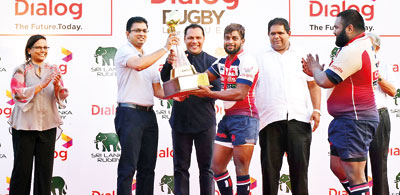Kandy’s turnaround an object lesson in game-change
View(s): There was no Houdini act in Kandy winning the Dialog Division ‘A’ Rugby League Championship after trailing in Round 1. Having lost two matches, one may not have expected to see Kandy crowned League Champs. The question is what happened to the bite that inflicted the sting on Kandy in Round 1. Kandy showed the ability and/or the knack to take the spoils when the odds were against them. Did the teeth become numb and sensitive, unable to gnaw or, was it that Kandy started to play better. The coaching input of Johan Taylor, who was not there for Round 1, probably revolved around a better game plan. This, I think, was one aspect that contributed better to Kandy’s change of gears.
There was no Houdini act in Kandy winning the Dialog Division ‘A’ Rugby League Championship after trailing in Round 1. Having lost two matches, one may not have expected to see Kandy crowned League Champs. The question is what happened to the bite that inflicted the sting on Kandy in Round 1. Kandy showed the ability and/or the knack to take the spoils when the odds were against them. Did the teeth become numb and sensitive, unable to gnaw or, was it that Kandy started to play better. The coaching input of Johan Taylor, who was not there for Round 1, probably revolved around a better game plan. This, I think, was one aspect that contributed better to Kandy’s change of gears.
Is it worth to look at how they did it when the chips were down? This may not only help the other clubs, as well as schools, but also the National team which has to make an effort to rank higher in Asian Rugby. The Knockout may be an opportunity for those who could not lay their hands on the League, to get even. Kandy’s first game will be against the CH, while Havelocks play Police. Both Kandy and Havelocks can, on performance in the League, find safe passage into the semifinals.
Taking a look at the season that Kandy ascended, I noticed the ability they had, to make holes in the oppositions’ defence. What I saw, in their matches against the Havelock’s and before that, against the Air Force, was the ability to run and create space, so that the gaps opened. Whereas, most teams, would run sideways and get pushed outside, as the threes had nowhere to run. What was apparent in the last match of the League was that, Navy, at most times, ended promising moves bundled to touch. In most matches, players did not run straight, while in others, there was no creation of space. Another problem was being slow on the field. Meaning, the game at the breakdown was slow, and Kandy did slightly more to speed up the game. As I have said before, what was it that was hoped to achieve by slowing down good ball and waiting for players to go for a hit?

The hard work throughout the Dialog Rugby League finally gets paid of for Kandy SC
The firepower of the bench and knowing when to use it, was another plus factor for Kandy, that gave them the depth that was required. You may say they have the numbers and the money to get those numbers. The most important question is whether money alone can induce numbers to come and perform. This is despite the chips being down, after having lost two early matches. Did the club keep blaming others for their misfortune and/or look inwards and identify and rectify what can be corrected, to go forward. If answers can be found, then there are reasons to study, than keep complaining or blaming others.
The season, as it approached the last weekend, saw the usual call for mating with foreign referees. Did it improve the game is what is most important. Having vigorously called for foreign referees to pair off, the groans continued, as the win was elusive. It was like the women who mate and wriggle in pleasure, and curse the mate when they feel pains at childbirth. The fact, however, remains that the game is now moving from club to school, where the shouting will be more intense. I do not say that the local referees are the best in the world or, in Asia. They make mistakes like everybody else does on the field, all over. On the other hand, is Rugby in Sri Lanka world class or, for that matter, even Asia class. We have TMO (Television Match Officials) which may not be in practice in other parts of Asia. We have citing officers which many countries may not have. Have anyone of these helped or, has it improved that game. Probably, it has helped doubting Thomas’ to think there is a third eye. Going by the gossip that I have been eavesdropping on, the pains have started to question the third eyes too.
It is more or less a fact that players have got accustomed to the need to release a tackled player or, the tackler to release the ball. We see players with the ball get onto their feet and play the ball. Generally, these result in a howl, but gradually, players have latched onto to complying with the law. The non-compliance with safety aspects has been drawing many penalties and yellow cards during the club season. This is not going to be easy, as people still tend to say “this is not Netball”, when high and/or dangerous tackles are penalised. It is true that it is not Netball nor another non-contact sport. The issue, however, lies with the need to ensure safety of players and is about player welfare.
Vimal Perera is a former Rugby Referee, coach and Accredited Referees Evaluator IRB Â Â


